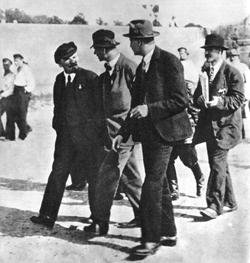
Principles of Socialism and the War of 1914-1915:
The Attitude of Socialists to Wars
(Chapter One: Socialism and War, 1915)
Socialists must not only demand the unconditional and immediate liberation of the colonies without compensation--and this demand in its political expression signifies nothing else than the recognition of the right to self-determination; they must also render determined support to the more revolutionary elements in the bourgeois-democratic movements for national liberation in these countries and assist their uprising--or revolutionary war, in the event of one--against the imperialist powers that oppress them.
The Socialist Revolution and the Right of Nations to Self-Determination (1916)
We welcome the close alliance of Moslem and non-Moslem elements. We sincerely want to see this alliance extended to all the toilers of the East. Only when the Indian, Chinese, Korean, Japanese, Persian, and Turkish workers and peasants join hands and march together in the common cause of liberation--only then will decisive victory over the exploiters be ensured.
To the Indian Revolutionary Association (May 20, 1920)

See our page on the early Communist International for the "Draft Theses on the National and Colonial Questions" submitted to the Second Congress of the CI, which were drafted by Lenin, his "Report on the Commission on the National and Colonial Questions," and related documents.
Marxists on India index
Karl Marx on India and Colonialism
Friedrich Engels on Colonialism and Revolution in India
Karl Kautsky and the Second International on the Colonial Question
The Early Third (Communist) International on the Colonial Question
Leon Trotsky on India and Permanent Revolution
The Trotskyist Press on India/Sri Lanka, 1938-1952
On the development of the Leninist program of fighting for the defense of backward countries against imperialism and the defeat of all sides in an inter-imperialist conflict through socialist revolution, see "Marxism, War and the Fight for Socialist Revolution," Workers Vanguard
anti-caste: links
email us
anti-caste home